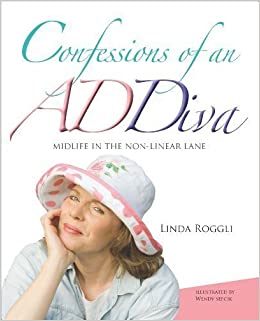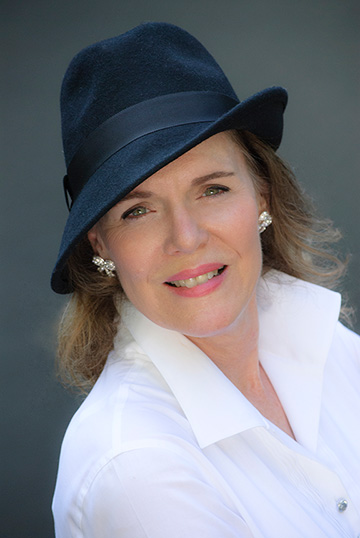Linda Roggli is the creator of the ADHD Women’s Palooza, a Professional Certified Coach (PCC), award-winning author and founder of the A-D-Diva Network for ADHD women 40-and-better. She is an internationally recognized expert in midlife and senior ADHD. She co-founded the ADHD Parents’ Palooza and launched the first ADHD Couples Palooza in 2021. Her popular Get Organized program features live organizing sessions. She hosts ADDiva women’s beach retreats each fall.
Linda’s book Confessions of an ADDiva- midlife in the non-linear lane won first prize for women’s issues in the prestigious Next Generation Indy Book Awards competition. She chairs the webinar series for ADDA. She lives in Durham, NC with her slightly OCD husband, one OCD cat, four adorable ADHD Shelties and 12 cackling Hens.

Midlife women have moments when they are sure they have lost their minds. Is it “menopausal madness” or is it ADD? In this lighthearted, inspirational book, Linda Roggli tells what it’s like to live forty-five years with undiagnosed ADD (Attention Deficit Hyperactivity Disorder); the diagnosis explains a lot! Memory lapses, running late for appointments, losing not only the car keys but the car in the parking lot! It’s all part of the ADD woman’s experience. In this engaging, lighthearted and startlingly honest book, Linda, a bona fide ADDiva in her own right, comes out of her (messy) ADD closet to share the highs and lows of life in the non-linear, spontaneous, creative lane. Written in ADD-friendly style with lots of illustrations and white space, Confessions of an ADDiva may be the first book you’ll actually finish…and then be sorry to see it end. Bound to inspire mid-life ADD women (diagnosed or not) regardless of the challenges they face!
FWM: You are an internally recognized expert in midlife, and senior ADHD. Share your backstory.
No one was more surprised than I when a couple’s counselor suggested I might have ADHD. I literally laughed in his face, then realized he was serious. Determined to prove him wrong, I drove straight to the nearest bookstore and flipped through the book he recommended: “Driven to Distraction.” OMG. I couldn’t get to the check out line fast enough!
I read in the parking lot, I read at stoplights on the way home and I devoured the book in two days. It explained so much: why I was often late to appointments, why I started a lot of interesting projects but had trouble finishing them, why I was always scooting right up to the deadline with college assignments, why I was baking cookies at 10 am for my son’s class party at 10:30, and why I had perpetual piles(usually papers or clothes). It was the lightbulb, Aha moment that changed how I saw my life in retrospect. The therapist who told me I was “other directed” was only half right; yes, I paid rapt attention to how others talked, dressed and socialized but it was because my social skills were delayed because of my ADHD. Yes, I was “controlling” but my ADHD brain was going 1000 miles an hour so I needed to control SOMETHING externally. Not a good coping strategy, by the way.
I waffled between accepting the ADHD diagnosis (I was 15 minutes late to the ADHD psychiatrist appointment and talked so fast you almost needed a translator) and dismissing it as simply an error in judgment on the doctor’s part. Eventually I was diagnosed three times before I realized I truly had an ADHD brain. And it wasn’t the end of the world.
I had accommodated my ADHD all these years (47 of them) by working in deadline driven businesses (news, advertising, my own company) and by taking on one more project than I could really handle to keep myself busy and interested (paying attention). But the cost was high: I burned out and closed my advertising agency. I couldn’t trust myself to follow through even on things I enjoyed. I felt guilty a lot of the time.
But as I say in the first line of my book “I’ve stopped apologizing to doorknobs…” My apologies were on speed dial until I embraced my ADHD and stopped fighting it.
FWM: What are some of the misnomers about people with ADHD?
ADHD was not even on the horizon when I started my career – mostly because ADHD in women was rarely recognized until the mid to late 1990s (and actually is still under diagnosed).
I set my sights on TV news as a young girl, watching Walter Cronkite and Jessica Savitch although my dad wanted me to be a doctor. I worked in radio advertising instead, then newspaper journalism, and finally radio and TV news in Louisville, KY. After we moved to NC, I was the grants and partnership director for the inner-city school district and finally founded my own advertising agency – Exclusive Writes, Inc. It was sometime in the late 1990s that I was diagnosed with ADHD. And when I hit burnout with my advertising career, I took some time off and retrained as a spiritual life coach, then a Speaking Circles facilitator and finally as an ADHD coach. I specialize in working with ADHD women 40-and-better because at perimenopause, estrogen goes on a wild ride which impacts ADHD symptoms. Many women in the 40s and 50s are diagnosed with ADHD for the first time even though they have had an ADHD brain from birth. Suddenly everything makes more sense as they look back on their lives. That was certainly true for me.
Coaching is similar to therapy but has a different approach. Therapy often looks back at the reasons behind behavior and feelings. Coaching is about looking forward, setting goals and using outside accountability to achieve them. I was a certified life coach, then was certified by the International Coach Federation as a Professional Certified Coach. That means that I have thousands of hours of coaching experience and I maintain regular continuing education to keep my skills current. But that’s not enough for an ADHD coach — we need to stay abreast of cutting- edge research on cognition, aging, hormones, executive function, brain function — the list goes on and on.
FMM: Why do people seek you out for coaching?
I think it’s my candid and transparent approach. I am not afraid to share my ADHD experiences with ADHD so my clients feel comfortable sharing their own challenges. People often ask, “What happens during coaching?” I really don’t have a good answer because each client is different. One person may want to focus on getting things done at work, another may want to talk about a fractured relationship, still another may be finishing a graduate degree and can’t get down to research. I will say, we do have fun on coaching calls (usually via Zoom) and my clients tell me the work we do together does make a difference in their lives — as software developers, psychologists, engineers, professional skaters, university professors and more.

FWM: What will people notice about you?
It’s got to be my energy! I am enthused about life and that tends to be contagious. I have a sharp sense of humor and I am good at connecting the dots between and among a variety of issues that clients bring to our sessions. I am also 1000% equitable and have a strong belief in ensuring that everyone is treated fairly. Although it is unusual for most women, I also find that I can soothe conflict with all sides feeling heard and validated. I learned (far too late in life to save my first marriage!) that there is such a thing as win-win. That resolves a lot of heartache in relationships.
FWM: Tell us about the ADHD Women’s Palooza.
The ADHD Women’s Palooza sprang from my fervent desire to connect ADHD women with top experts and with each other. When I attended my first ADHD conference, I yearned for more time to sit and talk with other ADHD women. Did they experience the same crushing blows to self-esteem that I did? Did they make mistakes and apologize almost every day (sometimes every hour)? I wanted to be with other women who “got it.” So, I founded the ADDiva Network to bring women together. Then I created the ADHD Women’ Palooza to bring the experts to those women. In 2016, our first year, we hosted 35 experts in casual and candid conversation with accurate information about adult ADHD – something that is missing throughout much of the internet. It is a non-negotiable requirement that each year we also host an interactive event with ADHD women from all over the world, bringing them together so they can do exactly what I craved those many years ago: to talk to each other, hear each other’ stories and feel validated and relieved that they are not alone. It is the most richly rewarding part of the work I do…no…this is far too fascinating to call it work. Let’s call it play. And we play together with a lilt in our steps and a lighter song in our hearts.
Oh, by the way, the ADHD Women’s Palooza happens in February each year; find out more at http://adhdpalooza.com
You will also discover the ADHD Parents’ Palooza and the new ADHD Couple’s Palooza at the same website, too.
We have more than 350 archived recordings of the gold standard experts in their respective fields.


